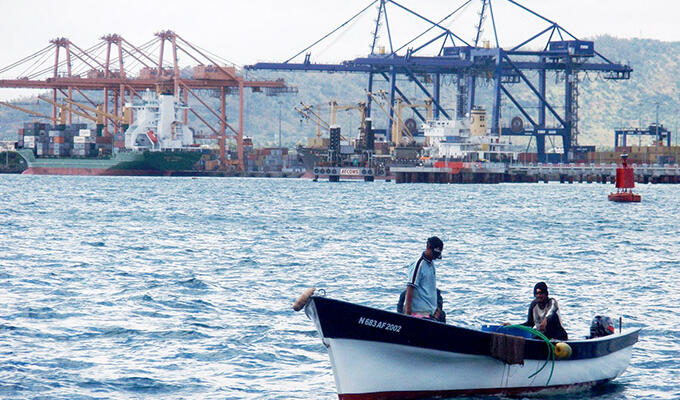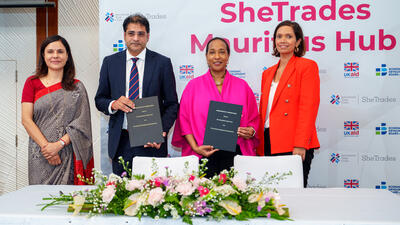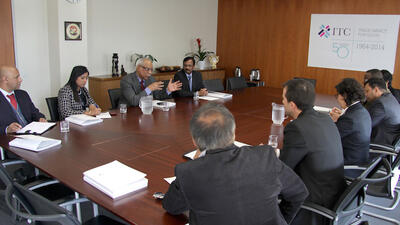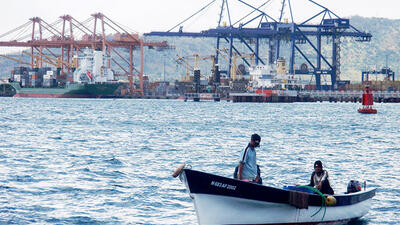

ITC Impact: Mauritius
Mauritius was among the first developing countries to submit its list of binding trade facilitation commitments to the World Trade Organization in July 2014, following assistance from ITC and the United Nations Conference on Trade and Development.
‘Trade facilitation is of key importance for countries seeking to take full advantage of market access, trade liberalization, and the economic development opportunities offered by international trade agreements,’ said Ambassador Israhyananda Dhalladoo, Permanent Representative of Mauritius to the WTO. ‘Despite trade openings, our exporters are still facing difficulties in areas such as customs procedures, logistics frameworks, and meeting technical and quality standards in target markets.’
The WTO Trade Facilitation Agreement, concluded in December 2013, is an important tool in helping developing countries and least developed countries (LDCs) reduce costs linked to international trade. This is particularly crucial for small and medium-sized enterprises (SMEs), which often lack the capacity, personnel and resources to navigate complex and expensive border procedures.
Upon entry into force, the Agreement will create binding obligations for WTO members to improve customs procedures, transparency and efficiency. For instance, governments will be required to publish information about import- and export-related rules and border procedures, trade-related fees, import duties and appeal procedures available to traders. They will have to simplify documentation requirements, and limit customs processing fees and charges so that they stay roughly in line with the costs they entail to governments. As a general rule, customs agencies will have to issue so-called ‘advance rulings’ setting out traded goods’ tariff treatment before they actually arrive at the border.
While simplifying border procedures and cutting red tape promises to substantially reduce trading costs around the globe, especially among developing countries, the capacity of developing country governments to implement these reforms varies considerably. During the negotiations that led to the Agreement, they insisted that they would need time and assistance to implement their prospective obligations.
As a first step towards implementation, therefore, the Agreement requires developing countries and LDCs to categorize their obligations under the treaty into so-called Category A commitments, which they will implement immediately, Category B commitments, which they are only in a position to implement later, and Category C commitments, for which they require assistance and support.
Mauritius was one of 19 countries that ITC assisted with categorizing obligations under the Trade Facilitation Agreement. The joint ITC-UNCTAD project kicked off with a national workshop in April 2014 with public and private stakeholders to introduce the Agreement and brainstorm about its importance and relevance to the private sector. ‘This created national momentum around the implementation process and emphasized the need to have a collaborative forum for regular consultation amongst the stakeholders including the private sector’, Dhalladoo explained.
Having sought the input of stakeholders from across the country, the government prepared the implementation plan. This was vetted in a second meeting, involving the business community, before the plan was actually submitted to the WTO, Dhalladoo said. ‘Most of the Category A measures identified by UNCTAD/ITC were taken into account when Mauritius notified its Category A commitments to the WTO,’ he said.
Public-private dialogue is the cornerstone of ITC’s approach to trade policy formulation. For trade policy to successfully bring the desired benefits to exporters, it is necessary for public and private sector representatives to work in coordination. ITC supports developing countries in creating platforms for such dialogue, and in facilitating the engagement of the private sector in various policy areas, including trade facilitation, said Mohammed Saeed, who heads the trade facilitation practice area t ITC. ‘Improving the business environment is the first step in increasing the competitiveness of SMEs,’ he noted.
In Mauritius, ITC and UNCTAD also assisted in the establishment of the Mauritius National Trade Facilitation Committee, which will remain instrumental in overseeing the implementation of the commitments, Dhalladoo explained.
It is important that ITC assist as many countries as possible, as this would contribute to the speedy implementation of the Agreement worldwide, Dhalladoo said. ‘We look forward to the full implementation of the Agreement not only in Mauritius, but also by our trading partners.
For an open economy such as ours, seamless borders are key to the international competitiveness of our enterprises.’ Reduced paperwork, advance processing of documents and the quick release of perishable goods are some of the measures that will help the island’s exporters, he added.
Mauritius has requested further assistance in implementing Category B and Category C measures, and looks forward to working with ITC in this area, Dhalladoo said.










